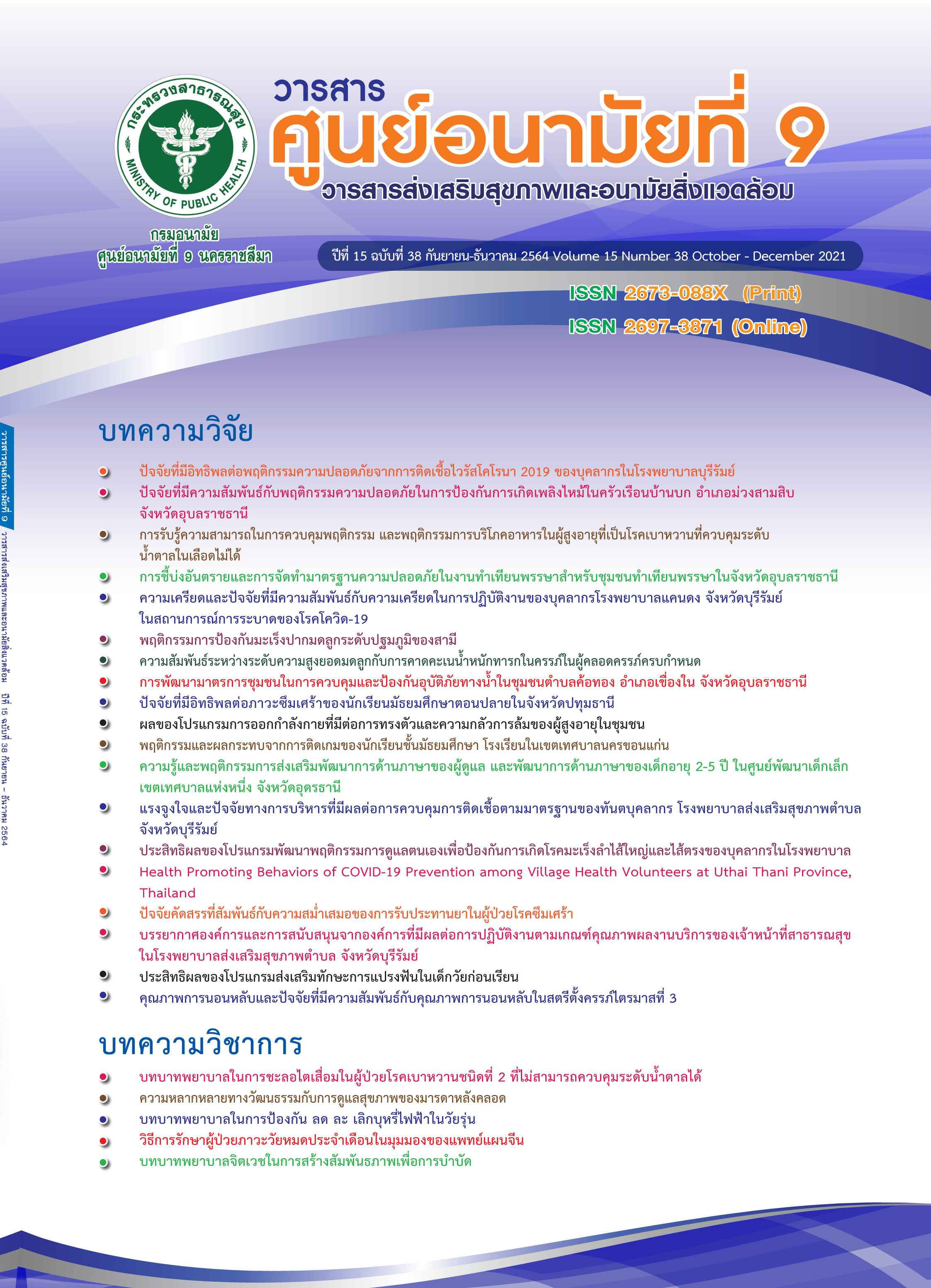วิธีการรักษาผู้ป่วยภาวะวัยหมดประจำเดือนในมุมมองของแพทย์แผนจีน
คำสำคัญ:
ภาวะวัยหมดประจำเดือน, วัยทอง, การฝังเข็ม, การฝังเข็มหู, กัวซา, สมุนไพรจีนบทคัดย่อ
วัตถุประสงค์เพื่อศึกษางานวิจัยในฐานข้อมูลของสาธารณรัฐประชาชนจีน เกี่ยวกับหัตถการทางการแพทย์แผนจีนในการรักษาอาการของภาวะวัยหมดประจำเดือน เพื่อเป็นอีกหนึ่งทางเลือกในการรักษาอาการภาวะวัยหมดประจำเดือน นอกเหนือจากการใช้ฮอร์โมนรักษา ซึ่งจะสามารถช่วยลดการเกิด ผลข้างเคียงและโอกาสเสี่ยงต่อการเกิดโรคต่างๆ ในผู้ที่ใช้ฮอร์โมนทดแทนในปริมาณที่สูง หรือใช้ต่อเนื่องเป็นระยะเวลานาน จากการศึกษางานวิจัยในสาธารณรัฐประชาชนจีน หัตถการหลักที่ใช้การรักษาอาการภาวะ วัยหมดประจำเดือน ได้แก่ การฝังเข็ม (ตามจุดฝังเข็มบนเส้นลมปราณ) การฝังเข็มหู การกัวซา และยาสมุนไพรจีน ซึ่งหัตถการที่ได้รับความนิยมมากที่สุดคือ การฝังเข็มร่วมกับสมุนไพรจีน เนื่องจากเป็นวิธีรักษาที่มีประสิทธิผลดีที่สุด สามารถปรับสมดุลฮอร์โมนภายในร่างกายและระบบการทำงานของอวัยวะภายในต่างๆ ทั้งยังช่วยขับเคลื่อนชี่ กระตุ้นการไหลเวียนเลือด เสริมสร้างสารสำคัญและเลือด เพิ่มพลังของไตหยินและ ไตหยาง ปรับสมดุลการไหลเวียนของเส้นลมปราณชงและเริ่น ทำให้หยินและหยางภายในร่างกายเกิดความสมดุล จึงสามารถลดอาการของภาวะวัยหมดประจำเดือนได้อย่างมีประสิทธิภาพ มีผลข้างเคียงน้อย และ จากการศึกษาพบว่า ศาสตร์การแพทย์แผนจีนยังแบ่งภาวะวัยหมดประจำเดือนออกเป็นหลายกลุ่มอาการ ดังนั้น จึงควรศึกษาเพิ่มเติมถึงจุดฝังเข็มที่ใช้บ่อย แนวทางการเลือกใช้จุดฝังเข็มร่วมกับการใช้ยาสมุนไพร ตลอดถึงขั้นตอนของหัตถการที่เหมาะสมกับแต่ละกลุ่มอาการ เพื่อให้ได้ประสิทธิภาพสูงสุดในการรักษา
เอกสารอ้างอิง
Zhang Yu Zhen. Chinese Medicine Gynecology. 2 nd ed. Bei Jing: Baoding Xicheng Offset Printing Co. Ltd.; 2017.
Li R, Miao Y, Miao M. Review of Characteristics of Menopausal Syndrome Treated by Chinese Medicine. Chian Journal of Chinese Medicine 2017;26(12):1521-1523. (In Chinese)
LEA L, SJOGREN, LINA S, March, Ellen Lokkegaard. Hormone replacement therapy and the risk of endometrial cancer. A systematic review. Maturitas 2016;91:25-35.
Chen X. Observation on the Clinical Effect of Shallow Acupuncture Combined with Body Acupuncture in the Treatment of Perimenopausal Syndrome with Kidney-yin Deficiency [Dissertation]. Fu Zhou: Fu Jian University of Traditional Chinese Medicine; 2020. (In Chinese)
Li S, Anna B, Yin P, Wang Z, Wu L, Xu S. Research progress of acupuncture and moxibustion treatment of perimenopausal hot flashes. Modernization of Traditional Chinese Medicine and Materia Materia-World Science and Technology 2019;21(8):1622-1627. (In Chinese)
Zhang H, Jing X, Wang B, Guo L, Li L, Yang J. Acupuncture treatment of perimenopausal syndrome of 30 cases. Chinese Acupuncture 2018;38(1):55-58. (In Chinese)
Song J. Clinical Observation of Acupuncture at the Eight Confluent Points for Perimenopausal Syndrome. Shanghai Journal of Acupuncture 2016;35(4):433-436. (In Chinese)
Chen Z. Acupuncture five zang – organs back acupoints in treatment of liver and kidney Yin deficiency type Perimenopausal syndrome in clinical research [Dissertation]. hu Bei: Hubei University of Traditional Chinese Medicine; 2018. (In Chinese)
Yang L. Clinical Observation on of the Therapeutic Effect of Acupuncture in Treating Deficiency of kidney Yin of Perimenopausal Syndrome [Dissertation]. Guang Zhou: Guangzhou University of Chinese Medicine; 2016. (In Chinese)
Tian M, Guo L. Observation on the Curative Effect of Acupuncture and Moxibustion in the Treatment of Perimenopausal Women with Stress Incontinence. People’s Military Surgeon 2019;62(4):343-345,352. (In Chinese)
Qin Y, Zhu H, Li F, Lang Y, Yun Z, Wang Z. Research Progress of Treatment of Peri-Menopausal Syndrome Mainly by Auricular Therapy. Liaoning Journal of Traditional Chinese Medicine 2017;44(12):2664-2666. (In Chinese)
Yang Y, Zou P, Gao H. Clinical study of auricular acupoint embedding combined with acupuncture in the treatment of perimenopausal insomnia. China Medical Herald 2020;17(15):143-146. (In Chinese)
Chen Y, Li H, Chen Y, Lu S. Clinical Observation of Auricular Point Pasting Therapy in Perimenopausal Non - Organic Insomnia of Liver Qi Stagnation in the Patients. World Journal of Integrated Traditional Chinese and Western Medicine 2017;12(2):211-214. (In Chinese)
Jia M, Huang L, Ai Y. Clinical Effect of Auricular Point Pressing Beads on Menopausal Insomnia. World Journal of Sleep Medicine 2018;5(4):458-461. (In Chinese)
Wang A, Duan P, Xia C, Xiao Z, Min W. Research Progress of Gua Sha in Treating Perimenopausal Syndrome. Guangxi Medical Journal 2019;41(18):2370-2373. (In Chinese)
Meng F, Duan P, Hu Q, Wang Y, Qing W, Zhang M, Hu Y. Scrapping therapy combined with Qingxin Zishen Decoction for perimenopausal syndrome with pat-tern of fire excess from yin deficiency. Chinese Acupuncture & Moxibustion 2016;36(8):821-826. (In Chinese)
Wang Y, Zhang H, Lang T, Yang J. Observation of Clinical Curative Effect of Gua Sha on Perimenopausal Syndrome. 2017 World Acupuncture Academic Conference and 2017 Annual Meeting of China Acupuncture and Moxibustion Society 2017.325-326. (In Chinese)
Li K. Modified Suanzaorentang 56 Cases Improve the Quality of Sleep in Patients with insomnia Menopause Effectiveness Analysis. System Medicine 2016;1(2):31-33. (In Chinese)
Wang X. Clinical Effect of Bushen Lemian Decoction on Refractory Insomnia in Perimenopausal Women. Guide of China Medicine 2021;19(2):139-140. (In Chinese)
Zhang Y, Zhang H. Clinical Observation on Treatment of Female Menopausal Constipation (Liver stagnation and qi stagnation type) with Modified Xiaoyao Powder and Acupuncture. Journal of External Therapy of TCM 2018;27(6):36-37. (In Chinese)
Xiao X, Zhang Y, Cao J. Effect of combined acupuncture and Shugan Jianpi Jieyu decoction on menopause Kupperman score and anxiety and depression score in patients with perimenopausal depression. Shaanxi Traditional Chinese Medicine 2018;39(11):1617-1619. (In Chinese)
Quan X, Xu L, Song C, Liu J, Liu Y. The clinical efficacy of Ziyin Pinggan Bushen decoction and acupuncture treatment in liver and kidney Yin deficient perimenopausal syndrome. Journal of Southeast University (Med Sci Edi) 2019;38(4):672-676. (In Chinese)
Wu Y, Fan Y, Fu W. Modern Literature Study on Acupuncture-moxibustion for Perimenopausal Insomnia. Shanghai J Acu-mox Jul 2016;35(7):893-898. (In Chinese)
Sui l. Treatment of perimenopausal depression with acupuncture and medicine (kidney deficiency and liver depression Type) clinical observation [dissertation]. Liao Ning: Liaoning University of Traditional Chinese Medicine; 2019. (In Chinese)
ดาวน์โหลด
เผยแพร่แล้ว
รูปแบบการอ้างอิง
ฉบับ
ประเภทบทความ
สัญญาอนุญาต
ลิขสิทธิ์ (c) 2021 วารสารศูนย์อนามัยที่ 9 : วารสารส่งเสริมสุขภาพและอนามัยสิ่งแวดล้อม

อนุญาตภายใต้เงื่อนไข Creative Commons Attribution-NonCommercial-NoDerivatives 4.0 International License.
บทความหรือข้อคิดเห็นใด ๆ ที่ประกฎในวารสารศูนย์อนามัยที่ 9 เป็นความคิดเห็นของผู้เขียน บรรณาธิการ คณะผู้จัดทำ และศูนย์อนามัยที่ 9 นครราชสีมา (เจ้าของ) ไม่จำเป็นต้องเห็นด้วย ผู้เขียนต้องรับผิดชอบต่อบทความของตนเอง
ผลการพิจารณาของกองบรรณาธิการและผู้ทรงคุณวุฒิถือเป็นที่สิ้นสุด คณะบรรณาธิการวารสารฯ ขอสงวนสิทธิ์ในการตรวจแก้ไขข้อความให้ถูกต้องตามหลักภาษาและมีความเหมาะสม
กองบรรณาธิการวารสารฯ ขอสงวนสิทธิ์มิให้นำเนื้อหาใด ๆ ของบทความ หรือข้อคิดเห็นใด ๆ ของผลการประเมินบทความในวารสารฯ ไปเผยแพร่ก่อนได้รับอนุญาตจากกองบรรณาธิการ อย่างเป็นลายลักษณ์อักษร และผลงานที่ได้รับการตีพิมพ์ถือเป็นลิขสิทธิ์ของวารสารศูนย์อนามัยที่ 9


